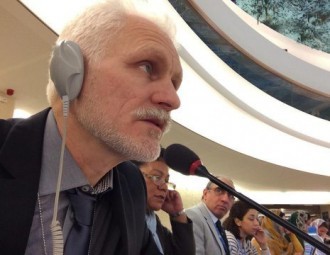Ales Bialiatski spoke at the session of the UN Human Rights Council in Geneva

Ales Bialiatski managed to tell about the importance of human rights defendants’ work and disclose the problems of their persecution in Belarus.
On March 5 Ales Bialiatski, the vice-President of the International Federation for Human Rights, chairman the Human Rights Centre “Viasna” took the floor at the 28th session of the Human Rights Council of the United Nations, HRC “Viasna” informs.
"I spoke on behalf of all defenders of peace and therefore outlined the most important problems. I made several accents in my report, - the human rights defendant commented about the topics he touched in his three-minute report. – First, I pointed at the usefulness of the so-called country mandates, i.e. when special rapporteurs are appointed for individual countries, like Miklos Haraszti has been appointed a rapporteur on Belarus”.
Ales Bialiatski believes that this practice “presents a great opportunity for international assessment and monitoring of human rights situation in individual countries”, as in Belarus, where “the special rapporteur… is actually watching what is happening in the country during the year, and this becomes a certain limiter for the level of repression”.
The second problem covered by the chairman the Human Rights Centre “Viasna” was the harassment faced by human rights defenders around the world. “Often such persecution has a pseudo-legal nature, as far as the authorities use the laws which restrict and criminalize human rights activities and limit their financing,” –Bialiatski marked, exemplifying his point with Russia, where many human rights organizations are now labelled as “foreign agents”, which gives them a very negative connotation.
Thirdly, the human rights defendant spoke about universal rights: “Very often the authorities of those countries where human rights are violated justify these violations by references to traditions, religion, some national values, etc. This is absolutely wrong, since human rights are universal”.
Ales Bialiatski called the United Nations Human Rights Council to protect civil society in the countries where it is persecuted, and to use all the means and opportunities for it.
-
03.01
-
07.10
-
22.09
-
17.08
-
12.08
-
30.09



























